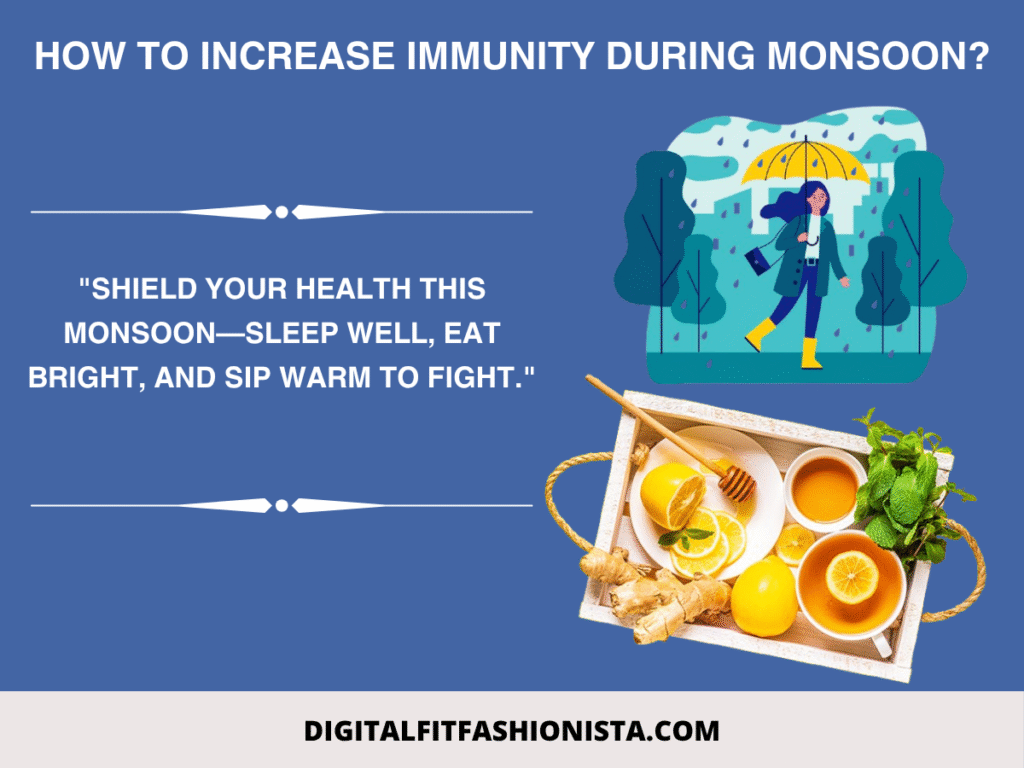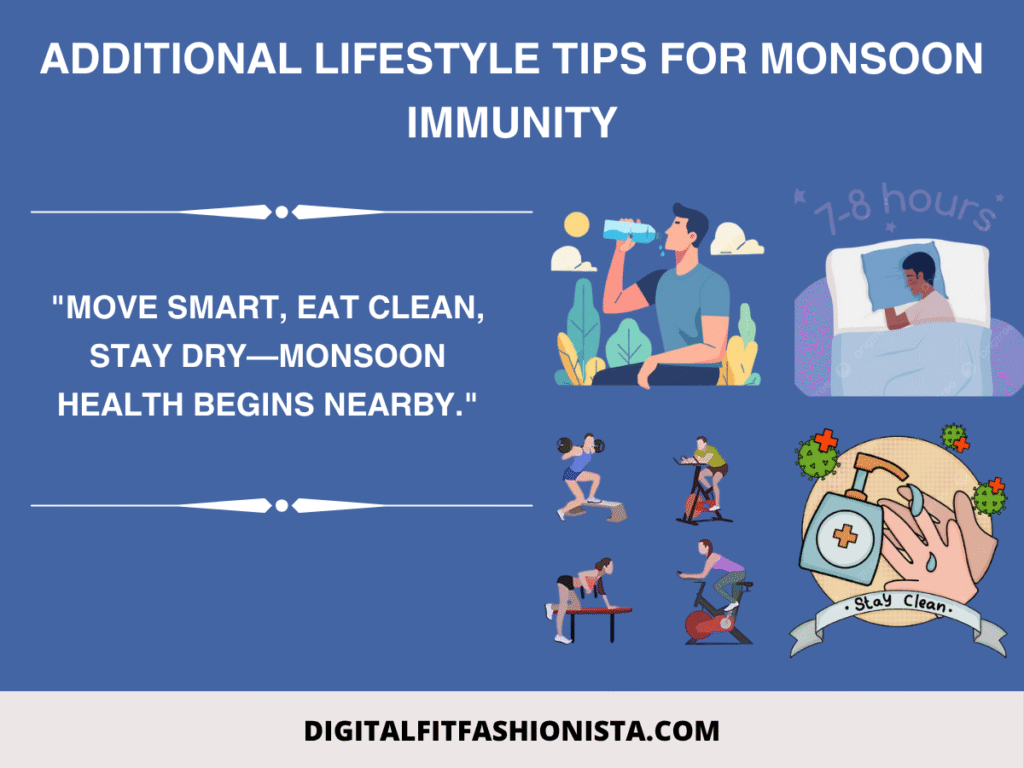How to increase immunity during monsoon? This is a question many people ask when the rainy season arrives.
While monsoon brings cool breezes and refreshing rains, it also invites unwanted infections, colds, and seasonal diseases.
Our body needs extra care during this time to stay strong and healthy. So, how can you protect yourself and enjoy the rain without falling sick?
In this article, we’ll share simple yet powerful tips to boost your immunity naturally, from the right foods to easy lifestyle habits that keep you fit all season.
Keep reading to discover practical ways to stay healthy during the monsoon!
How to increase immunity during monsoon?

During the monsoon, our body becomes more prone to infections due to humidity and sudden weather changes. To stay healthy, it’s important to focus on foods and habits that naturally strengthen your immune system.
Include Vitamin C-rich fruits like oranges and amla, maintain good hydration, and add spices like turmeric and ginger for extra protection.
Along with a balanced diet, proper sleep, and regular exercise can also keep your immunity strong. Simple lifestyle changes can make a big difference in avoiding seasonal illnesses.
1. Increase Your Vitamin C Intake

Vitamin C is one of the most important nutrients for boosting immunity, especially during the rainy season when viral infections are common.
It helps white blood cells function better and protects the body against harmful microorganisms. Vitamin C is also a strong antioxidant that fights free radicals and reduces oxidative stress.
Why it is important: It helps in preventing cold and cough, shortens the duration of infections, and keeps your immune cells active.
Natural Sources of Vitamin C:
- Citrus fruits like oranges, lemons, and limes
- Vegetables such as red bell peppers, broccoli, and tomatoes
- Amla (Indian gooseberry), which is known as an immunity superfood
Extra Tip: If your diet lacks enough Vitamin C, consult a doctor before taking supplements.
2. Maintain Adequate Vitamin D Levels
Most people associate Vitamin D with bone health, but it is equally important for your immune system. It activates immune cells that fight infections. Unfortunately, during monsoon, reduced sunlight exposure can lead to Vitamin D deficiency, making you more prone to infections.
How to Maintain Vitamin D:
- Spend 15–20 minutes in sunlight whenever possible, preferably in the morning or midday
- Add Vitamin D-rich foods like salmon, tuna, egg yolks, fortified cereals, and dairy products to your diet
- Take Vitamin D supplements if recommended by a doctor
3. Add Omega-3 Fatty Acids to Your Diet
Omega-3 fatty acids are essential for reducing inflammation and improving immune response. They also support heart and brain health, which becomes important during seasonal changes. Omega-3s help white blood cells fight infections effectively.
Best Sources of Omega-3:
- Fatty fish such as salmon and sardines
- Plant-based sources like walnuts, flaxseeds, chia seeds, and soybeans
- Omega-3 fortified oils
High-Protein Foods to Include:
Eggs, chicken, and fish
Soy products like tofu and soy milk
Lentils, beans, chickpeas
Nuts and seeds for plant-based protein
5. Consume Antioxidant-Rich Foods

Antioxidants play a major role in protecting the body from oxidative stress caused by free radicals. This damage can weaken your immune system, so consuming antioxidant-rich foods is a must.
Examples of Antioxidant Foods:
Berries like strawberries and blueberries
Dark chocolate (in moderation)
Leafy greens like spinach and kale
Beetroot and green tea
Ayurveda recommends several herbs and spices that boost immunity naturally. These traditional remedies have antibacterial, antiviral, and anti-inflammatory properties, making them perfect for fighting seasonal infections.
6. Powerful Ayurvedic Herbs and Spices:
Ayurveda offers powerful natural remedies to boost immunity, especially during the monsoon when infections are common.
Herbs and spices like turmeric, ginger, garlic, tulsi, giloy, and amla are known for their antibacterial, antiviral, and anti-inflammatory properties.
Turmeric, rich in curcumin, helps fight inflammation and strengthens the immune system.
Ginger supports digestion and protects against infections, while garlic is well-known for its antiviral benefits.
Tulsi (Holy Basil) safeguards respiratory health.
Giloy detoxifies the body and enhances immunity, and amla juice serves as an excellent source of Vitamin C for overall health.
Including these Ayurvedic ingredients in your daily routine can help your body stay strong and protected throughout the monsoon season.
Ayurvedic Tip: Start your day with warm water mixed with turmeric and honey or drink amla/giloy juice for better immunity.
7. Include Probiotic Foods
Gut health plays a crucial role in maintaining a robust immune system. Probiotics are beneficial bacteria that enhance digestion, fortify the gut lining, and prevent harmful microbes from causing infections.
Probiotic-Rich Foods:
- Yoghurt and curd
- Buttermilk (chaas)
- Fermented foods like homemade pickles
- Probiotic drinks available in the market
Additional Lifestyle Tips for Monsoon Immunity
Apart from diet, some lifestyle practices can further help in boosting immunity and staying healthy during monsoon.

a) Stay Hydrated
Even though the weather is cooler, dehydration can still occur. Drink boiled or filtered water to avoid waterborne diseases. You can also drink herbal teas like ginger tea or tulsi tea for additional benefits.
b) Maintain Hygiene
Wash your hands frequently, keep your surroundings clean, and avoid eating unhygienic street food to prevent infections and stomach problems.
c) Get Enough Sleep
Sleep is essential for recovery and immunity. Lack of sleep weakens the immune system and makes you more susceptible to illnesses. Aim for 7–8 hours of quality sleep daily.
d) Exercise Regularly
Exercise improves blood circulation, reduces stress, and enhances immunity. If you cannot go outdoors due to rain, practice yoga, light workouts, or indoor aerobics for at least 20–30 minutes every day.
Foods to Avoid During Monsoon
Oily and fried foods slow down digestion
Raw leafy vegetables that may contain germs
Stale or uncovered food items can lead to food poisoning
Very spicy foods, which may cause acidity and discomfort
Conclusion
The monsoon season is beautiful but also comes with an increased risk of infections. To stay safe and healthy, make conscious choices about your diet and lifestyle.
Include Vitamin C, Vitamin D, Omega-3 fatty acids, protein-rich foods, antioxidants, and probiotics in your meals.
Add Ayurvedic herbs like turmeric, tulsi, and giloy for natural immunity support. Maintain hygiene, stay hydrated, sleep well, and exercise indoors.
By following these simple yet effective tips, you can boost your immunity, fight seasonal infections, and enjoy the monsoon without health worries.
FAQs
1. How can we prevent getting sick in monsoon?
To prevent sickness during the monsoon, maintain good hygiene, avoid street food, and drink only boiled or filtered water. Eat freshly cooked meals and include immunity-boosting foods like citrus fruits, amla, and green vegetables in your diet. Regular exercise, adequate sleep, and handwashing also help reduce the risk of infections.
2. How can I boost my immunity fast?
To boost immunity quickly, consume Vitamin C-rich foods such as oranges, lemons, and amla. Include turmeric, ginger, and garlic in your meals for their antibacterial properties. Stay hydrated, get at least 7–8 hours of sleep, and practice light exercise or yoga daily. Probiotic foods like curd and buttermilk can also strengthen gut health, which is key for immunity.
3. How to get vitamin D during monsoon?
During monsoon, sunlight exposure is limited, so spend 15–20 minutes outdoors whenever the sun is visible. Add Vitamin D-rich foods like eggs, fortified cereals, dairy products, and fatty fish to your diet. If deficiency persists, consult a doctor for Vitamin D supplements.
- Is it possible to reverse skin ageing? - August 21, 2025
- How to regain motivation during burnout? - August 12, 2025
- What is a digital detox day? - July 31, 2025


